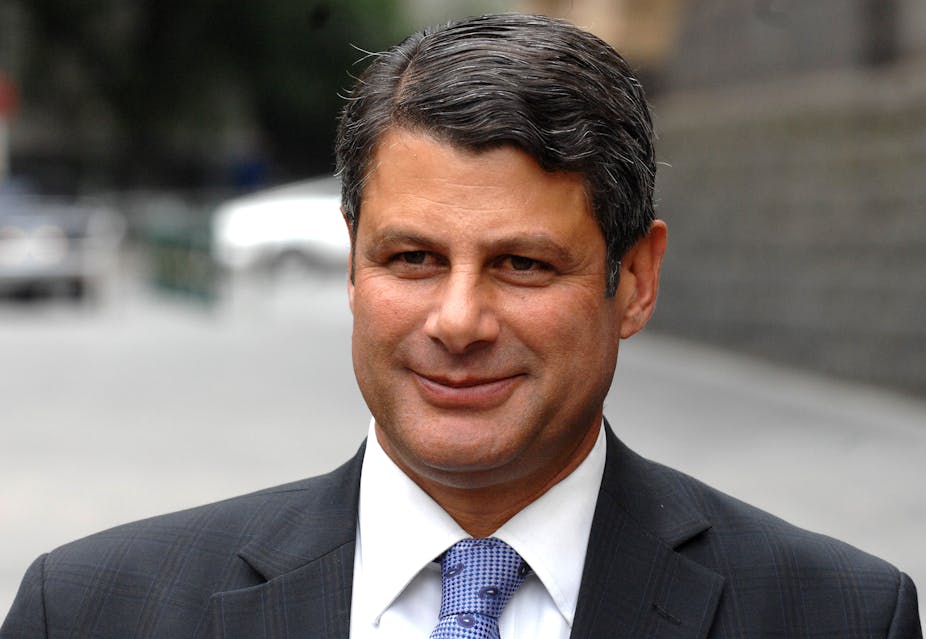In politics, timing is everything and few have managed their exit from public office with the grace and dignity of former Victorian Premier Steve Bracks.
So it is with a particularly bitter irony - another hallmark of the political game - that this In Conversation took place on the day that saw another Victorian Premier, Ted Baillieu, leaving his post, albeit in a very different manner from that of Bracks.
Despite his extraordinary political network, not even Steve Bracks could have known that afternoon that Denis Napthine, his opponent across the dispatch box from 1999 to 2002, was soon to belatedly take office in Victoria.
But there is more to political life than simply holding elected office. After leaving representative politics on his own terms, Bracks forged a career in business with construction industry super fund CBUS, while also working within the Australian Labor Party to enact the kinds of reforms he believes are necessary if it is to have an electable future.
In this In Conversation, Bracks delves beyond the day to day “horse race” aspects that bedevil so much political coverage to discuss how politics works at a more elemental level: the need for integrity to underpin successful communication of messages, the corrosive effect of the modern media cycle, his political inspirations and why he doesn’t have a Twitter account.
Click here for a full transcript
Stephanie Brookes: What makes a great communicator? What makes a politician a great communicator?
Steve Bracks: I think there’s several things. One is understanding and believing in what you’re saying. There’s no use just having an understanding without having a deep belief in what you’re about to communicate. That’s very important because you won’t come across effectively if you are simply mouthing words trying to persuade, acting as if you would like people to believe it, but not believing it yourself. So I think a sense of belief in what you do is very, very important and therefore you can persuade and argue the case on that basis.
I think secondly, understanding who you’re talking to. I used to always have a rule that if I was talking to say a press conference that goes out to every Victorian, you’re talking to the media through the microphones, but you’re not talking to the media and microphones you’re talking to people.
Stephanie Brookes: How do we have these bigger conversations in a space where things are moving so quickly?
Steve Bracks: I’m not against people having Twitter. I think social media is liberating in lots of ways, it’s great for democracy, I think it’s good. If I was there now I would want to manage and be on top of it, of course, and be much more accessible as a result, I think it’s a good part of it. I think the bad part is that you feel you have to respond every minute of the day. Does it matter if a premier or prime minister doesn’t have a view on Oprah Winfrey if she’s coming to Australia? But you’re there, you’ve got to be accessible, you’ve got to talk about it. Does it matter? Not really. That’s my point really. The only thing I can think of in handling the relentless 24-media cycle is to do your own thing and to be out there on content when you have content to be out there on. I think that’s probably the mistake people make, is my preliminary view anyway.
Stephanie Brookes: So how do we make space then? I see concerns in the United States about the divisiveness of political debate and the kind of adversarial nature of some of that in politics. Is that something you worry about in Australia?
Steve Bracks: No I don’t worry about that. I don’t have a problem with adversarial politics, I think it’s good for contestability and I would expect nothing less. This is nothing new, it’s a joke really to analyse this as something new. In the 1950s in Australia, post war, we had governments that were brought down on adversarial politics, between the Queensland government and split of the Labor party. We talk about schisms and differences now, not really, not as big, there’s always been strong philosophical differences. I’d argue the opposite; I’d say the philosophical differences are probably a bit less. There’s been a merge to the middle much more than there used to be. I think that’s not a fair analysis and is it a bad thing that you have robust and strong debate about issues and differences? No, I don’t think it’s a bad thing. I think it’s a pretty poor that it’s just simply about nothing. But I think it’s a common view, “why can’t they just get together for the good of the nation?” sort of a top of the head view. “Wouldn’t it be much nicer if they all just agreed?”
Stephanie Brookes: You’ve also spoken a lot about multicultural issues and that as a priority. How do you see that playing out?
Steve Bracks: We’re a bit different in Victoria, aren’t we? We understand, the others don’t as much. I’m a strong advocate of multiculturalism, I think it’s enriched us, it’s been a great benefit to Australia and I would hate to see for short-term political aims that we jeopardise the very thing that’s a great asset to us.

